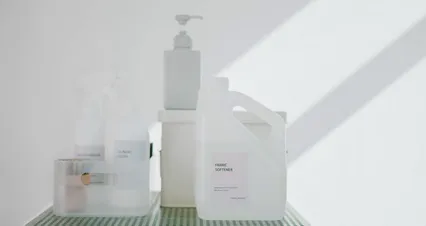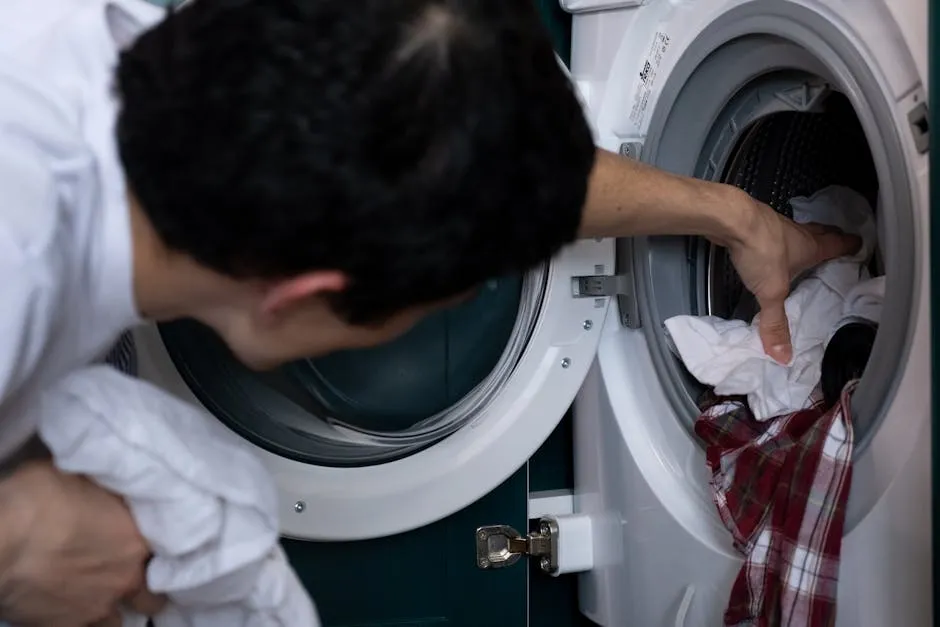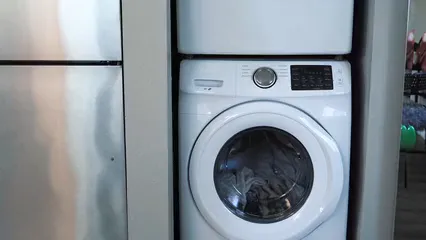
Why Does My Laundry Room Smell Like Sour Milk?
Introduction
Have you ever walked into your laundry room and noticed an unpleasant odor, like sour milk? You’re not alone. Many people face this issue. It’s a common problem that can arise from various sources. Addressing these smells is crucial for a fresh home environment. A musty laundry area can make your entire home feel less inviting.
Summary and Overview
In this article, we’ll break down the potential culprits behind that sour milk smell. We’ll discuss sources of these unpleasant odors and their impacts on your laundry. You can expect practical solutions and preventive measures to tackle these issues effectively. Regular maintenance and cleaning play a vital role in keeping your laundry room odor-free.
Understanding the Causes of Sour Milk Smell
Damp Clothes and Mildew
Damp clothes sitting in your washer can lead to odors quickly. When wet items are left too long, mildew and bacteria thrive. This can produce those nasty smells that linger in your laundry. Studies indicate that mildew can develop within just 24 hours in damp environments. It’s essential to remove clothes promptly after washing to prevent this.

Washing Machine Issues
Another common cause of sour smells is your washing machine itself. Over time, detergent and fabric softener residues can build up. This residue can trap moisture and create an ideal breeding ground for bacteria. Front-load washers are particularly susceptible to these issues due to their design. To identify if your washing machine is the source, check for any visible buildup in the drum or rubber door seal. Regular cleaning of your washer is essential to avoid this problem.
By addressing these causes, you can significantly reduce the sour milk smell in your laundry room. Keeping your laundry fresh is just a few simple steps away!
Improper Drying Techniques
Have you ever pulled clothes from the dryer and noticed a damp smell? This often results from improper drying techniques. When clothes don’t dry completely, moisture lingers. This moisture encourages bacteria and mildew growth, leading to unpleasant odors.
Airflow plays a crucial role in the drying process. Clothes need space to breathe while drying. If they’re packed too tightly, air can’t circulate. This lack of airflow can cause dampness, even if the clothes are in the dryer for a long time.

Statistics show that bacteria can double in number every 20 minutes in warm, moist environments. This means leaving clothes damp for too long can create a breeding ground for odors. Ensuring your clothes dry thoroughly is essential for a fresher smell.
Detergent and Fabric Softener Residues
Are you using too much detergent? Or maybe too little? Both can lead to odors in your laundry. Using too much detergent can leave a residue on clothes. This residue can trap moisture and odors, creating a sour smell.
Fabric softeners can also contribute to this issue. They can build up in your washing machine, trapping dirt and mildew. Over time, this buildup can lead to unpleasant odors in your laundry.
Instead of fabric softeners, consider alternatives. White vinegar is a great natural option that softens clothes and neutralizes odors. White vinegar can also be used in your rinse cycle to keep your clothes smelling fresh. Baking soda can also enhance the cleaning power of your detergent, helping to eliminate smells effectively.

Environmental Factors
Did you know that humidity can worsen laundry odors? High humidity levels make it difficult for clothes to dry completely. This can lead to musty smells that linger in your laundry room.
Ventilation is key in maintaining a fresh environment. A laundry room without proper airflow can quickly develop odors. Storing dirty laundry in a closed space can also exacerbate the issue.

To combat these factors, try to keep your laundry area well-ventilated. Open windows or use a ventilation fan to improve airflow. Store dirty clothes in breathable bags to minimize odors. Keeping your laundry room dry and airy will help keep those sour smells at bay.
Solutions to Eliminate Sour Milk Smell
Regularly Cleaning Your Washing Machine
Cleaning your washing machine is essential for preventing odors. For front-loaders, check the rubber door seal for build-up. Wipe it down regularly to prevent mold growth. For top-loaders, ensure the detergent dispenser is clean.

To clean your machine, use natural cleaners like vinegar and baking soda. Pour two cups of vinegar into the drum and run a hot cycle. This will help eliminate odors and buildup.
Aim to clean your washing machine every month. Regular maintenance will keep your washer fresh and odor-free, ensuring your laundry comes out smelling great every time. Don’t forget to invest in a washing machine cleaner to keep it in top shape!
Proper Laundry Practices
Are you tired of that sour milk smell lingering in your laundry room? Implementing proper laundry practices can make a big difference!

First, always pay attention to load size. Overloading your washer can prevent clothes from getting clean. This can lead to residue buildup, which contributes to odors. Aim for smaller loads, allowing enough space for detergent to circulate.
Next, temperature matters. Washing your clothes in hot water can help kill bacteria and eliminate odors. However, always check care labels to avoid damaging fabrics. For delicate items, consider using a cold wash with a quality detergent designed to work in lower temperatures.
When it comes to drying, ensure your clothes are completely dry. If you’re using a dryer, select the right setting. An “extra dry” option can help eliminate dampness. If air drying, hang clothes with enough space between them for airflow. This prevents moisture accumulation, which can lead to odors.
Lastly, avoid leaving wet clothes in the washer. If you can’t transfer them right away, try to set a timer. Leaving items damp for too long encourages bacteria growth. This simple practice can save you from unpleasant smells later on.
Using Air Fresheners and Deodorizers
Is your laundry room still smelling off? Let’s introduce some fresh scents into the space!

Natural methods can be effective. Baking soda is a great deodorizer. Simply place an open box in your laundry room to absorb odors. You can also sprinkle some directly into your laundry while washing.
Essential oils can add a pleasant touch. A few drops of oils like lavender or lemon can freshen up your space. Mix them with water in a spray bottle and mist around the room.
If you prefer commercial products, many air fresheners are specifically designed for laundry areas. Look for options that neutralize odors rather than just masking them. Products containing activated charcoal or odor-eliminating enzymes can be particularly effective.
To maintain a pleasant scent, regularly clean your laundry area. Dust and wipe surfaces to prevent odors from settling in. Keeping your laundry room tidy will help create a more inviting space.
Addressing Ventilation Issues
Proper ventilation is key to preventing sour smells in your laundry room. Without airflow, moisture can linger, leading to musty odors.

Start by ensuring your laundry room has adequate ventilation. If possible, open windows while doing laundry to let fresh air circulate. If that’s not an option, consider using a fan to improve airflow.
Dehumidifiers can also be beneficial, especially in humid climates. They remove excess moisture from the air, reducing the chances of mildew growth. Regular use of a dehumidifier can keep your laundry area dry and fresh.
Exhaust fans are another great solution. Installing one can help expel humid air and prevent odors from building up. Make sure to run the fan during and after laundry sessions to promote effective ventilation.

By addressing ventilation, you can significantly reduce unpleasant smells. A well-ventilated laundry room will help maintain a clean and inviting atmosphere in your home.
Preventive Maintenance Tips
To keep your laundry room smelling fresh, regular maintenance is essential. Here’s a handy checklist to follow:
- Check for Leaks: Inspect hoses and connections monthly. Leaks can lead to dampness, promoting odors.
- Clean the Washer: Run a cleaning cycle every month. Use vinegar to eliminate build-up and odors.
- Inspect for Mold: Regularly check hidden areas for mold. Pay attention to the rubber door seal and detergent drawer.
- Ventilation Checks: Ensure vents are not blocked. Good airflow helps prevent musty smells.
- Declutter the Space: Keep your laundry area organized. Clutter can restrict airflow, leading to dampness.
Keeping your laundry room clutter-free is vital. A tidy space promotes better airflow, reducing humidity levels. This simple act can make a significant difference in preventing sour smells.

Conclusion
In summary, addressing the causes of sour milk smells in your laundry room is crucial. Damp clothes, washing machine issues, and poor ventilation can all contribute to unpleasant odors. By implementing preventive measures, you can maintain a fresher laundry space. Regular checks and cleaning are essential for a pleasant environment. Start today to enjoy a more inviting laundry room!
FAQs
What causes my laundry to smell like sour milk?
Common causes include damp clothes, mildew, and build-up in your washing machine. Ensure clothes dry completely to prevent these odors from developing.
How can I clean my washing machine to eliminate odors?
To clean your washing machine, run a hot cycle with vinegar and baking soda. This helps remove residues and eliminates odors effectively.
Is it safe to use vinegar in my laundry?
Using vinegar in your laundry is both safe and effective. It acts as a natural deodorizer, neutralizing odors without harsh chemicals. Vinegar also helps break down detergent residues, leaving your clothes cleaner. Additionally, it softens fabrics without the buildup associated with commercial fabric softeners. Just add a cup of white vinegar to your rinse cycle. This simple addition can freshen your laundry and keep your washing machine clean.
How often should I clean my laundry room?
Cleaning your laundry room should be a monthly routine. This helps maintain a fresh environment. Start by wiping down surfaces to remove dust and lint. Pay special attention to areas around the washing machine and dryer. Every few months, check for leaks or moisture issues. This prevents mold growth and odors. Also, consider a deep clean every six months. This includes scrubbing floors, cleaning the washing machine, and decluttering storage areas.
Can I prevent sour smells from occurring in the first place?
Preventing sour smells is all about good habits. First, always dry your clothes thoroughly before storing them. This prevents moisture buildup. Secondly, clean your washing machine regularly with vinegar or baking soda. Ensure proper ventilation in your laundry room by keeping windows open or using fans. Lastly, avoid overloading your washer. This allows detergent to circulate effectively and keeps your laundry smelling fresh.
What should I do if the smell persists after cleaning?
If the smell persists, there might be deeper issues. Check your washing machine for hidden mold or mildew. Inspect the rubber seal and detergent drawer for buildup. If you find any residue, clean it thoroughly with a vinegar solution. Additionally, try running an empty hot cycle with vinegar and baking soda. If odors continue, consider contacting a technician to inspect your machine for any issues.
Are there specific detergents that can help with odors?
Yes, some detergents are specifically formulated to combat odors. Look for brands that contain enzymes designed to break down odor-causing bacteria. These detergents can be especially effective for gym clothes or heavily soiled items. Additionally, some products include baking soda or activated charcoal, which help absorb odors. Always follow the recommended usage instructions for the best results. Switching to a detergent that targets odors can greatly improve your laundry experience.
Please let us know what you think about our content by leaving a comment down below!
Thank you for reading till here 🙂
All images from Pexels




